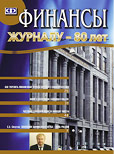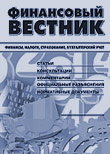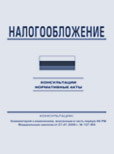Содержание
Финансы и бюджет: проблемы и решения
E-mail: finance-journal@mail.ru
Обзор выступлений Председателя Правительства РФ Д.А. Медведева, министра финансов РФ А.Г. Силуанова, председатель Центрального банка РФ Э.С. Набиуллиной, председатель Счетной палаты Т.А. Голиковой, губернатора Московской области А.Ю. Воробьева и других участников расширенного заседания Коллегии Минфина России, которое состоялось 20 апреля 2016 года.
А.М. Лавров, заведующий кафедрой НИУ ВШЭ, профессор, действительный государственный советник Российской Федерации 1 класса
Е.А Домбровский, советник государственной гражданской службы Российской Федерации 2 класса, кандидат экономических наук
E-mail: Evgeniy.Dombrovskiy@minfin.ru
Тенденции к повышению долговой нагрузки на региональные и местные бюджеты поставили в повестку дня вопрос о необходимости изменения подходов к формированию системы межбюджетных отношений, в том числе перераспределении в пользу консолидированных бюджетов субъектов РФ части бюджетных доходов. В статье анализируются данные о степени и качестве децентрализации доходов бюджетной системы Российской Федерации по сравнению с другими странами.
Ключевые слова: межбюджетные отношения, консолидированные бюджеты, налоговые и неналоговые доходы, бюджетная децентрализация.
К 71-й годовщине Великой Победы
В.Н. Семенов, ветеран Великой Отечественной войны
E-mail: finance-journal@mail.ru
Эта публикация – воспоминания ветерана Великой Отечественной войны, доктора экономических наук, заместителя министра финансов СССР в 1986–1991 годах В.Н. Семенова, после тяжёлого ранения в 1945-м окончившего войну в звании старшего лейтенанта и узнавшего окопную жизнь, что называется, из первых рук.
В.В. Воробьев, генерал-полковник, начальник Главного Финансового управления МО РФ (1991–1995 гг.), доктор экономических наук, профессор
E-mail: finance-journal@mail.ru
В статье анализируются бюджеты СССР 1941–1945 годов, состав расходов и источники, за счет которых они покрывались (речь идет не только о бюджетных расходах), рассматривается финансирование перевода промышленности с Запада на Восток, организация финансового обеспечения военнослужащих и их семей, т.е. – вклад военных финансистов в Великую Победу.
Ключевые слова: расходы на оборону, Фонд обороны, Фонд Красной Армии, кассовое обслуживание войск, денежное довольствие военнослужащих.
А.Г.Коломиец, доктор экономических наук, профессор
E-mail: finance-journal@mail.ru
Автор рецензии на коллективную монографию («Экономический фундамент Победы: параллели истории и современности». // Под. ред. Караваевой И.В. Институт экономики РАН. – СПб.: АЛЕТЕЙЯ, 2016. – 344 с.) оценивает достоинства книги: актуальность темы, широкий круг охваченных вопросов, использование малоизвестных ранее источников, объективный взгляд авторов и т.д., стараясь обосновать, и не без оснований, полезность и своевременность выхода книги в свет.
Москва финансовая
E-mail: finance-journal@mail.ru
Интервью с министром Правительства Москвы, руководителем Департамента финансов города Москвы
Е.Ю. Зяббаровой, в котором она рассказывает, как бюджет столицы 2015 г. отреагировал на непростую экономическую ситуацию и как он исполнен; а в чем сегодня основная особенность деятельности Департамента финансов Москвы.; какие задачи в области повышения эффективности бюджетных расходов ставит перед собой Департамент; как он взаимодействует с муниципалитетами, а также отвечает на другие вопросы.
Ключевые слова: доходы бюджета, расходы бюджета, государственный долг, эффективность бюджетных расходов.
Казначейство: становление и развитие
А.Ю. Демидов, заместитель руководителя Федерального казначейства, доктор экономических наук
E-mail: elaburceva@roskazna.ru
В статье рассматривается богатый успехами и ошибками опыт России в проведении административной реформы, которую можно рассматривать как преобразования в государственном менеджменте. Дается понятие «государственный менеджмент», а также его развитие и теоретическая проработка.
Ключевые слова: государственный менеджмент, органы государственной власти, программно-целевое управление.
Налоги: теория и практика
Н.И. Малис, заведующая кафедрой «Налоговое консультирование» Финансового университета при Правительстве РФ, профессор, кандидат экономических наук
E-mail: malis.nina@mail.ru
Игорный бизнес – один из самых доходных, но его налогообложение требует особого подхода, В РФ правила налогообложения игорного бизнеса, который в большинстве регионов запрещен, строятся по принципу вмененного налогообложения, призванного обеспечить получение государством средств. Однако пока уже созданные игорные зоны не дают ожидаемого эффекта и поступления средств в бюджеты соответствующих субъектов РФ не окупают затраты на их создание. Автор анализирует возникающие здесь проблемы и вскрывает недостатки действующего налогового механизма, формулирует предложения по их устранению.
Ключевые слова: налог на игорный бизнес, вмененный налог, труднооблагаемые налогоплательщики, игорный стол, касса тотализатора и букмекерской конторы, игровой автомат, бюджеты субъектов РФ, игорные зоны.
Страхование
Э.С. Гребенщиков, кандидат исторических наук
E-mail: finvestnik@mail.ru
В материале анализируются изменения в системе регулирования и надзора за перестраховочной деятельностью в США, целью которых является повышение устойчивости не только страховой отрасли, но и всей финансовой сферы после периода турбулентности. Серьезно укрепилась роль федеральных властей благодаря учреждению нового агентства - Федеральной страховой службы, чьи полномочия не ограничиваются информационно-аналитической работой. Описаны также шаги по большей унификации или координации подходов отдельных штатов к трансграничной перестраховочной деятельности, смягчение требований к перестраховщикам-нерезидентам. Приводится статистический материал, недвусмысленно характеризующий огромный вклад глобальных перестраховщиков в возмещение убытков, понесенных американскими цедентами и повышение финансовой устойчивости перестрахователей. Вместе с тем текущая реформа, осуществляемая Национальной ассоциацией страховых комиссаров и Федеральной страховой службой, хотя и признает приоритет международных норм при соблюдении определенных условий, но не подрывает «страховой суверенитет» отдельных штатов, которые самостоятельно выбирают режим регулирования трансграничного перестрахования и условия допуска на свой внутренний рынок.
Ключевые слова: трансграничное перестрахование, эксцедентное страхование, гарантирующие соглашения, сертификация иностранных юрисдикций, обеспечение, паспортизация, исходящее и входящее перестрахование.
А.Д. Воронина, Финансовый университет при Правительстве Российской Федерации
E-mail: nelly-1994@mail.ru
Автор рассматривает текущую ситуацию на страховом рынке России с точки зрения эффективности и рентабельности страхового бизнеса, описывает сложившуюся систему показателей рентабельности, достаточной и минимальной одновременно. Она предлагает разделение показателей на две группы: общепринятые и специфические показатели рентабельности страховой деятельности. В материале отмечается слабая научная проработка связанных с темой статьи вопросов при том, что на практике показатели рентабельности уже нашли широкое применение. Исследователь считает необходимым использовать показатели, помогающие оценить эффективность деятельности отдельных подразделений страховых организаций.
Ключевые слова: страхование, эффективность, система показателей рентабельности, рентабельность страховой, перестраховочной и инвестиционной деятельности.
Финансовый контроль и аудит
О.А.Михеева, заместитель председателя Правительства Самарской области – руководитель службы государственного финансового контроля Самарской области
E-mail: sarael@mail.ru
В статье приводится характеристика основных способов организации деятельности органов государственного финансового контроля на основе практики трехлетней деятельности службы государственного финансового контроля Самарской области, а также освещаются перспективы развития предлагаемой модели организации контрольной деятельности.
Ключевые слова: государственный и муниципальный финансовый контроль, контрактная система, нарушения бюджетного законодательства, административная и уголовная ответственность за финансовые и бюджетные нарушения, совершенствование законодательства о государственном финансовом контроле.
Научные исследования аспирантов и соискателей
З.И. Мусаева, магистрант, кафедра прикладной социологии, Финансовый Университет при Правительстве Российской Федерации
E-mail: Zalina.Musaeva@minfin.ru
В условиях экономической нестабильности более явно обозначается необходимость повышения финансовой грамотности населения. В мире существуют различные инициативы в области финансового образования. Каждое государство внедряет их исходя из собственного уровня экономического, финансового, социального развития, потребностей населения и менталитета. В статье проанализирован опыт реализации программ по повышению финансовой грамотности населения в России и в мире.
Ключевые слова: финансовая культура, финансовая грамотность, Национальные стратегии финансового образования.
Annotation
E-mail: finance-journal@mail.ru
Overview of the speeches of the Chairman of the Government of the Russian Federation – D.A. Medvedev, Minister of Finance of the Russian Federation – A.G. Siluanov, Head of the Central Bank of the Russian Federation – E.S. Nabiullina, Head of the Accounts Chamber – T.A. Golikova, Governor of the Moscow Region – A.Y. Vorobiev and other participants at the extended meeting of the Collegium of the Ministry of Finance of Russia passed on 20th of April 2016.
A.M. Lavrov, head of chair of the National Research University Higher School of Economics, professor, 1st class full state councilor of the Russian Federation.
E.A. Dombrovskiy, 2nd class councilor of the state civil service of the Russian Federation, candidate of economic sciences.
E-mail: Evgeniy.Dombrovskiy@minfin.ru
Tendencies to increase the debt burden on regional and local budgets put in the agenda a question about the necessity of changes of approaches to formation of the system of interbudgetary relations including redistribution of part of budget revenues in favor of the consolidated budgets of subjects of the Russian Federation. Article analyzes data about the extent and quality of decentralization of revenues of the budget system of the Russian Federation in comparison with other countries.
Keywords: interbudgetary relations, consolidated budgets, tax and non – tax revenues, budget decentralization.
V.N. Semenov, veteran of the Great Patriotic War.
E-mail: finance-journal@mail.ru
This publication is memories of the veteran of the Great Patriotic War, doctor of economic sciences, deputy Minister of Finance of the USSR in 1986 – 1991 – V.N. Semenov, after a hard injury in 1945 he finished the war with the rank of senior lieutenant learned the life in the trenches firsthand.
V.V. Vorobiev, general – colonel, head of the Main Financial Department of the Defense Ministry of the Russian Federation (1991 - 1995), doctor of economic sciences, professor
E-mail: finance-journal@mail.ru
Article analyzes the budgets of the USSR in 1941 – 1945, structure of expenditures and sources by which they were covered (not only the budget costs), considers financing of transfer of industry from West to East, organization of financial provision of military personnel and their families, i.e. contribution of military financiers in the Great Victory.
Keywords: defense expenditures, Fund of defense, Fund of the Red Army, cash service of troops, cash allowance of military personnel.
A.G. Kolomiets, doctor of economic sciences, professor.
E-mail: finance-journal@mail.ru
Author of the review on the collective monograph (“Economic foundation of the Victory: parallels of history and modernity”. // Under the edition of I.V. Karavaeva Institute of Economics of the Russian Academy of Sciences. – St.P.: ALETEIA, 2016 – 344 pages) assesses the advantages of the book: relevance of the topic, wide range of covered questions, use of previously little – known sources, objective view of the authors and etc., trying to justify the usefulness and timeliness of the publication of the book.
E-mail: finance-journal@mail.ru
Interview with the Minister of Moscow Government, head of the Finance Department of Moscow – E.Y. Zyabbarova, in which she tells how the budget of capital 2015 responded to the difficult economic situation and how it was executed, what is the main feature of activities of Department of Finance of Moscow today, what are the main targets in the area of increase the efficiency of budget expenditures set by the Department, how it interacts with the municipalities and also answers other questions.
Keywords: budget revenues, budget expenditures, public debt, efficiency of budget expenditures.
A.Y. Demidov, deputy head of the Federal Treasury, doctor of economic sciences.
E-mail: elaburceva@roskazna.ru
Article considers the experience of Russia rich in successes and mistakes in conducting the administrative reform which can be considered as a transformations in public management, provides the definition of “public management” and also its development and theoretical study.
Keywords: public management, government authorities, program – target management.
N.I. Malis, head of chair “Tax consulting” of the Financial University under the Government of the Russian Federation, professor, candidate of economic sciences.
E-mail: malis.nina@mail.ru
Gambling business is one of the most profitable, but its taxation requires special approach, in the Russian Federation taxation of gambling business, prohibited in the most regions, is based on principle of imputed taxation that gives the State guarantee of receipt of funds. The creation of the gambling zones didn’t give the expected results and funds that come in the budgets of the relevant subjects of the Russian Federation don’t pay back the costs of creation of the gambling zones. Author analyses appearing issues and reveals disadvantages of the existing tax mechanism, formulates the proposals on their elimination.
Keywords: gambling, gambling tax, imputed tax, taxpayers, gambling table, cashier of tote and bookmakers, slot machine, the budgets of the subjects of the Russian Federation, gambling zones.
E.S. Grebenshchikov, candidate of historical sciences.
E-mail: finvestnik@mail.ru
Dr. Eduard Grebenshchikov writes about changing system of non-resident reinsurance regulation in the USA prompted by turbulent developments in the financial sphere and aimed at early detection and prevention of systemic problems in the insurance sector and protection of the interests of the insureds. The major novelty is the creation of Federal insurance organization (FIO), whose powers are not limited to the tasks of information bureau. FIO undertook to dismantle excessive collateral requirements for foreign reinsurers through signing cover agreements with other countries and certification of their supervisory systems. Still the states of the USA have preserved their “insurance sovereignty” and have final say in this regard. In that way hybrid system of regulation emerged in the USA. The author makes references to the reports published by FIO which highlight the dominating role foreign-controlled reinsurers play by evaluating and insuring large scale American risks not to say about huge sums paid in claims settlements. No unified American insurance market is in sight, the emphasis is to adapt the current hybrid system of regulation to the challenges of global economy and principle of free trade in reinsurance services with decentralized system of insurance regulation staying intact.
Keywords: Federal insurance office, NAIC, excess of loss, inward and outward reinsurance, collateral, cover agreements, state-based regulation, certification, foreign jurisdictions, Bermuda.
A.D. Voronina, Financial University under the Government of the Russian Federation
E-mail: nelly-1994@mail.ru
The author examines the situation in the insurance market, analyzes the effectiveness of the insurance business in modern conditions, and proves the importance of a system of indicators of the profitability, which is the minimum and sufficient at the same time. She offers to separate indicators into two groups: common and specific indicators of insurance activities profitability, emphasizes the lack of a unified approach to the structure and contents of these indicators by modern researchers and analysts. The author thinks it is necessary to include indicators in the system reflecting the effectiveness of individual units of insurance organizations.
Keywords: insurance, efficiency, system of indicators of profitability, the profitability of the insurance, reinsurance and investment activities.
O.A. Mikheeva, Deputy Chairman of the Government of the Samara Region – Chief of the State Financial Control Service of the Samara region.
E-mail: E-mail: sarael@mail.ru
This article contains description of main methods of organization of activities in the state financial control services on the base of State financial control Service of the Samara region practice for three years, including possibilities of development of these methods.
Keywords: state and municipal financial control, contract system, violation of the budget legislation, administrative and criminal responsibility for financial and budgetary violations, development of the state financial control legislation.
Z.I. Musaeva, student of the magistracy, chair of Applied Sociology, Financial University under the Government of the Russian Federation.
E-mail: Zalina.Musaeva@minfin.ru
In the conditions of economic instability the necessity of increase the financial literacy of population is more clearly identified. There are various initiatives in the sphere of financial education in the world. Each state implements them on the basis of its own level of economic, financial and social development, needs of population and mentality. Article analyzes the experience of implementation of programs on improvement the financial literacy of population in Russia and in the world.
Keywords: financial culture, financial literacy, National strategies of financial education.











